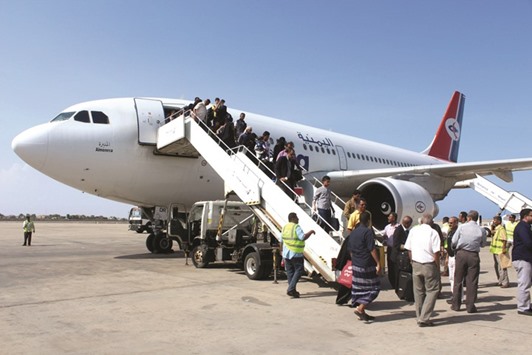The head of the Yemeni government delegation at troubled peace talks in Kuwait yesterday demanded action from UN mediators over rebel shelling of besieged third city Taiz.
Foreign Minister Abdulmalek al-Mikhlafi said the artillery fire by rebels was in contravention of undertakings they had given when face-to-face negotiations resumed on Wednesday following a three-day walkout by his team.
But the Houthi Shia rebels countered that it was pro-government forces that were stoking the violence in Taiz in a bid to avoid holding serious negotiations on a political settlement.
Mikhlafi said his negotiators had submitted proposals to UN envoy Ismail Ould Cheikh Ahmed for implementing an April 11 ceasefire in Taiz, where loyalist troops have been under rebel siege for months, trapping tens of thousands of civilians.
“We received a racist response” from the rebels, the minister said on Twitter, demanding action from the UN envoy.
He accused the rebels and their allies in renegade army units still loyal to ousted president Ali Abdullah Saleh of “attacks on civilians in Taiz”.
But rebel spokesman Mohamed Abdessalam said it was the government that was responsible for the flare-up in Taiz.
“The forces of aggression are blocking political discussions in Kuwait... by invoking false pretexts alongside a serious escalation,” Abdessalam said on Twitter.
Taiz lies on one of the fault lines of the conflict that has raged since March last year between the rebels and the government and its allies in a Saudi-led military coalition.
The city was part of north Yemen before the unification of the country in 1990 but, unlike the capital and the northern mountains where the Houthi Shia rebels have their main support base, it is overwhelmingly Sunni.
Mikhlafi warned that rebel shelling of Taiz would “have serious consequences on the peace process,” unless the international community honours its undertakings to shore up the fragile ceasefire.
The warring parties have traded repeated allegations of truce violations.
The government delegation pulled out of the talks on Sunday in protest at the rebels’ overrunning of one of the few loyalist bases in the northern mountains in what it said was a clear breach.
There has been mounting international pressure to end the conflict that has killed more than 6,400 people and displaced 2.8mn since March last year.
The hard-won talks opened in Kuwait on April 21 but the first round of face-to-face negotiations was held only last Saturday.
Al Qaeda militants quit two towns, say relieved residents
Al Qaeda militants yesterday began to pull out of two southern Yemeni town, residents said, following weeks of mediation by tribesmen for them to exit peacefully rather than resist a Gulf-backed offensive.
Dozens of fighters in Zinjibar and Jaar, the two largest towns in southwestern Abyan province, were seen leaving with their weapons to the surrounding countryside.
Al Qaeda in the Arabian Peninsula took advantage of over a year of war in Yemen to seize towns along a 600km stretch of Arabian Sea coastline.
But Yemeni troops backed by a Saudi-led military coalition pushed the group out of its main base in the port city of Mukalla late last month, depriving them of the estimated $2mn a day in revenue from port taxes and fuel smuggling.
Saudi Arabia and its Gulf Arab allies intervened in the civil war in Yemen on March 26 last year in support of Yemen’s government after it was pushed into exile by the Iran-allied Houthi group.
The war has killed more than 6,200 people, displaced more than 2.5mn and caused a humanitarian catastrophe in one of the world’s poorest countries.
Coalition bombing had mostly ignored the steady rise of AQAP until forces funded and trained by the United Arab Emirates launched a surprise attack to win Mukalla last month.
But an armed push toward Qaeda-held towns in Abyan and neighbouring Lahj province proved more difficult, and militants launched repeated suicide attacks against Yemeni forces.

Passengers disembark from a Yemenia aircraft coming in from Jordan yesterday at the International Airport in Aden, the first passenger plane landing after the airport reopened yesterday after months of closure due to security issues.
